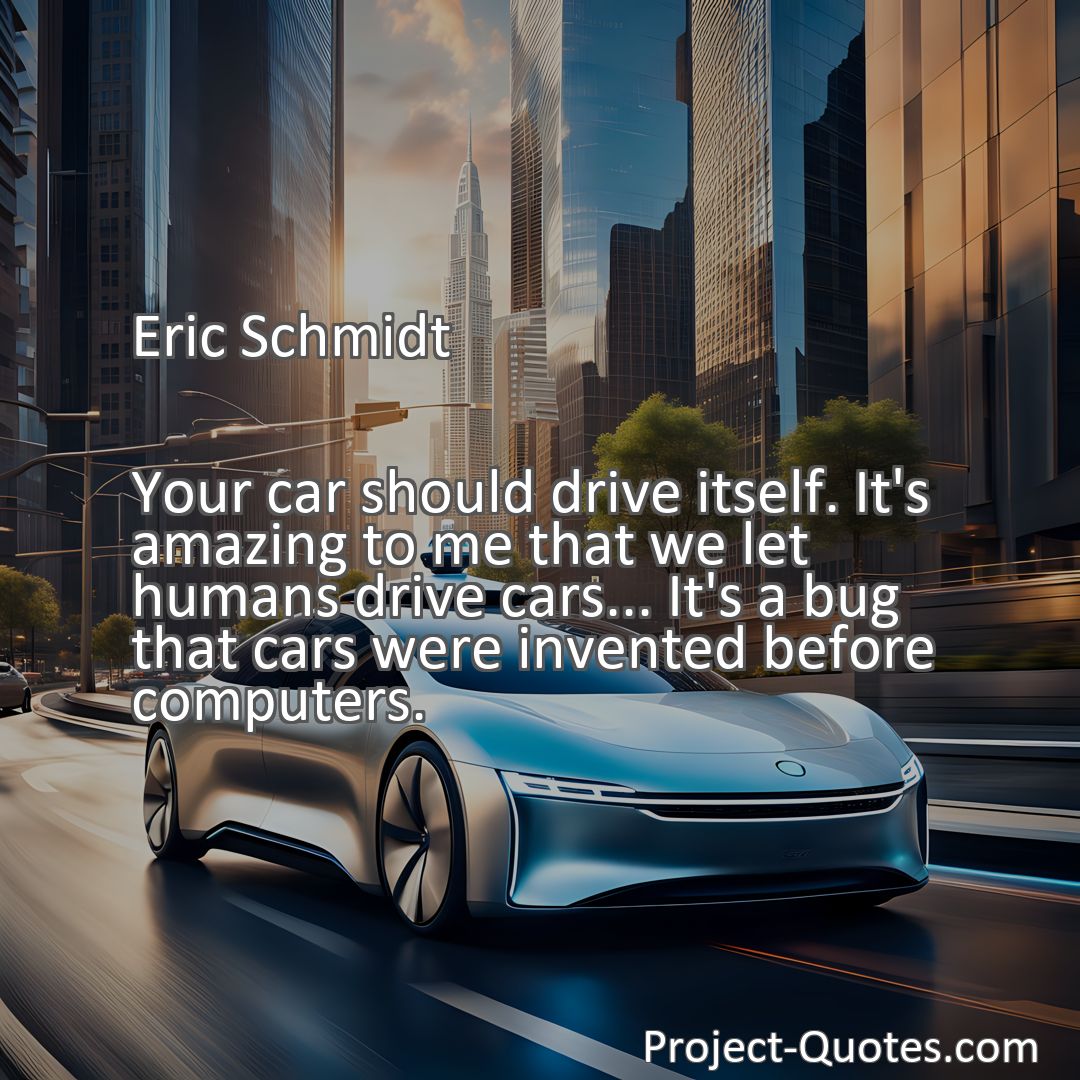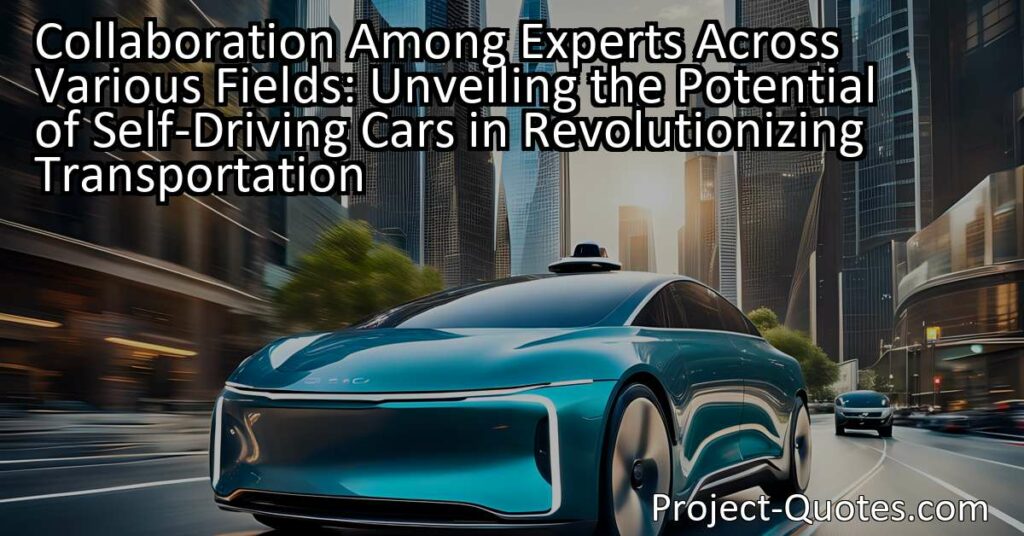Your car should drive itself. It’s amazing to me that we let humans drive cars… It’s a bug that cars were invented before computers.
Eric Schmidt
Collaboration among experts across various fields is crucial for the development and adoption of self-driving cars. These experts, including engineers, software developers, and transportation experts, must work together to overcome challenges such as trust, job displacement, ethics, and technology. By collaborating and sharing their expertise, these experts can ensure that self-driving cars revolutionize transportation in a safe, accessible, and sustainable way.
Table of Contents
- 1 Your car should drive itself. It’s amazing to me that we let humans drive cars… It’s a bug that cars were invented before computers.
- 2 Eric Schmidt
- 3 Meaning of Quote – Your car should drive itself. It’s amazing to me that we let humans drive cars… It’s a bug that cars were invented before computers.
- 4 Freely Shareable Quote Image
- 5 Related
Meaning of Quote – Your car should drive itself. It’s amazing to me that we let humans drive cars… It’s a bug that cars were invented before computers.
Imagine a world where you could sit back, relax, and let your car take care of the driving. Sounds like something out of a futuristic movie, right? Well, according to Eric Schmidt, former CEO of Google, this might not be far from reality. Schmidt once said, “Your car should drive itself. It’s amazing to me that we let humans drive cars… It’s a bug that cars were invented before computers.” Schmidt’s statement highlights the potential of self-driving cars and raises thought-provoking questions about the role of humans in transportation.
When we consider the numerous advancements in technology, it is indeed surprising that we still rely on fallible humans to navigate vehicles. Humans are prone to errors, distractions, and fatigue, all of which can lead to accidents on the road. Self-driving cars, on the other hand, are designed to minimize these risks by using advanced sensors, artificial intelligence, and computer algorithms to make split-second decisions.
One of the main advantages of self-driving cars is their potential to significantly reduce accidents. Studies show that the majority of car accidents are caused by human error. Whether it’s speeding, distracted driving, or driving under the influence, human mistakes can often be traced back to these unfortunate incidents. Self-driving cars have the potential to eliminate these human errors, making our roads safer than ever before.
Moreover, self-driving cars have the capacity to revolutionize transportation for people who are unable to drive due to age, disability, or other limitations. Elderly individuals who may have lost their driving abilities could regain independence and mobility through self-driving cars. People with disabilities that currently restrict their access to public transportation could also benefit greatly from this technology, enabling them to travel without relying on others.
Beyond safety and accessibility, the advent of self-driving cars could also revolutionize our commuting habits. Imagine a daily commute where you can relax, catch up on work, or simply enjoy the ride, without having to worry about the stress of driving in heavy traffic. Self-driving cars have the potential to transform our daily routines, making commuting less of a chore and more of an enjoyable experience.
Furthermore, self-driving cars could have significant environmental benefits. A self-driving car can be programmed to achieve optimal fuel efficiency, reducing emissions and minimizing its carbon footprint. Additionally, self-driving cars can communicate with each other, forming a coordinated network that optimizes traffic flow, reducing congestion and the associated greenhouse gas emissions. By embracing self-driving cars, we could take a giant step towards building a more sustainable future.
Despite these promising advantages, the transition to a world dominated by self-driving cars does not come without challenges. One of the primary concerns is the question of trust. Can we truly trust technology to make complex decisions on our behalf? The idea of relinquishing control to a machine might evoke feelings of anxiety or fear. However, it is crucial to remember that self-driving cars are designed with safety as the utmost priority. Multiple layers of redundancies and fail-safes are built into their systems to ensure safe operations.
Another concern that arises is the potential for job loss due to the automation of transportation. With the rise of self-driving cars, the need for human drivers in industries such as taxi services and delivery may diminish. While this is a legitimate concern, it is important to note that new opportunities and jobs are likely to emerge in the autonomous vehicle industry, such as vehicle maintenance, software development, and fleet management. It is essential to focus on reskilling and retraining the workforce to adapt to the rapidly evolving job market.
Additionally, there are ethical dilemmas that need to be addressed in the realm of self-driving cars. For instance, if faced with a split-second decision to avoid an accident, should a self-driving car prioritize protecting its occupants or minimizing harm to pedestrians? These ethical dilemmas require careful consideration and a collaborative effort from stakeholders to establish guidelines and ethical frameworks for self-driving cars.
The development and adoption of self-driving cars also pose technological challenges. Building an autonomous vehicle that can navigate through various terrains, weather conditions, and unexpected circumstances is a complex task. Furthermore, integrating self-driving cars into existing infrastructure and ensuring seamless communication between vehicles and surrounding systems is a major undertaking. These technical obstacles require continuous research, innovation, and collaboration among experts across various fields.
In conclusion, Eric Schmidt’s quote suggesting that “Your car should drive itself” reflects the immense potential of self-driving cars to revolutionize transportation as we know it. The concept may seem far-fetched, but the advancements in technology make it increasingly feasible. Self-driving cars have the potential to enhance safety, accessibility, and sustainability in transportation. However, challenges related to trust, job displacement, ethics, and technology must be overcome. As we navigate the road towards self-driving cars, it is essential to approach this evolving technology with caution, collaboration, and an emphasis on striking a balance between innovation and ensuring the well-being of society as a whole.
I hope this quote inspired image brings you hope and peace. Share it with someone who needs it today!


